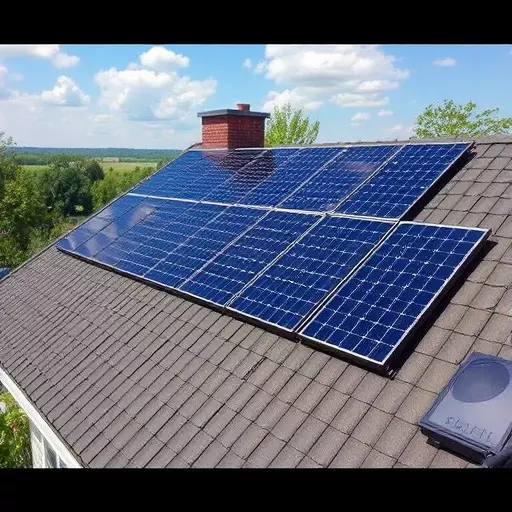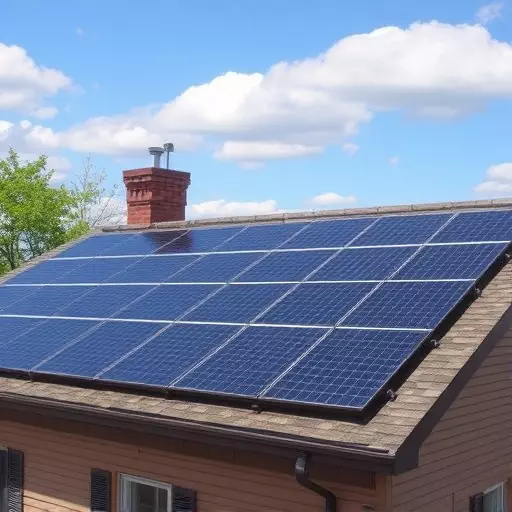Solar inverters are essential for converting DC electricity from photovoltaic (PV) roof panels or tiles into AC power in Appleton, Wisconsin. Advanced inverters offer improved efficiency, real-time monitoring via apps, and energy savings. Solar roofing with PV panels or tiles is gaining popularity due to its eco-friendly benefits, reduced utility bills, and increased home value. When choosing an inverter, consider factors like performance control, monitoring capabilities, safety, and upfront costs to maximize the potential of your solar roof tiles.
“Unleash the power of clean energy with a deep dive into the world of solar panel inverters. This comprehensive guide explores how these essential components serve as the gateway to harnessing sunlight for your Appleton, Wisconsin home. From understanding the fundamentals of photovoltaic roof panels and their benefits to navigating different inverter types and choosing the perfect match for your solar roofing project, we unlock the full potential of sustainable living through solar roof tiles.”
- Understanding Solar Inverters: The Gateway to Harnessing Clean Energy
- Photovoltaic Roof Panels: Unlocking the Potential of Solar Power for Your Home in Appleton, Wisconsin
- Benefits and Types of Solar Inverters: A Comprehensive Guide
- Integrating Solar Roof Tiles: Design Meets Sustainability
- How Solar Inverters Convert Sunlight into Electricity
- Choosing the Right Solar Inverter: Considerations for Your Appleton, WI Solar Roofing Project
Understanding Solar Inverters: The Gateway to Harnessing Clean Energy
Solar inverters are a crucial component in any solar energy system, acting as the gateway to harnessing and utilizing clean power generated by photovoltaic (PV) roof panels or solar roof tiles. In simple terms, they convert the direct current (DC) electricity produced by these panels into alternating current (AC) electricity that can be used in homes and businesses, or fed back into the grid. This transformation is essential as AC electricity is the standard form used in most power outlets.
For residents considering solar roofing in Appleton, Wisconsin, understanding inverters is key to making informed decisions. With advancements in technology, modern inverters offer enhanced efficiency, allowing for better energy production and savings. They also come with features like real-time monitoring through solar roofing apps, enabling users to track their system’s performance and ensure optimal energy yield from their photovoltaic roof panels or tiles.
Photovoltaic Roof Panels: Unlocking the Potential of Solar Power for Your Home in Appleton, Wisconsin
In Appleton, Wisconsin, homeowners are increasingly looking towards solar roofing as a way to unlock the potential of clean, renewable energy for their homes. Photovoltaic (PV) roof panels, also known as solar roof tiles, offer a seamless and aesthetically pleasing integration of solar technology with traditional roofing. These advanced panels convert sunlight directly into electricity, providing a reliable and sustainable power source for your home while potentially reducing utility bills significantly.
Appleton’s favorable climate makes it an ideal location for PV roof panels to thrive. With ample sunlight throughout the year, these panels can efficiently generate power, even in cold or cloudy conditions. By choosing solar roofing, Appleton residents can contribute to a greener environment and take advantage of long-term cost savings. This smart investment not only reduces their carbon footprint but also enhances the energy efficiency and value of their homes.
Benefits and Types of Solar Inverters: A Comprehensive Guide
Solar inverters play a pivotal role in any solar roofing system in Appleton, Wisconsin, converting the direct current (DC) electricity generated by photovoltaic (PV) roof panels into alternating current (AC) power that homes and businesses can use. They’re not just a necessary component; they’re a game-changer for renewable energy.
There are two main types: string inverters and microinverters. String inverters, the more traditional choice, connect in series to multiple PV panels, offering cost-effectiveness but with limited control over individual panel performance. On the other hand, microinverters, as the name suggests, are connected directly to each panel, providing enhanced monitoring, higher efficiency in partial shading scenarios, and improved safety features—all while slightly increasing upfront costs. When considering a solar roofing system for your Appleton home or business, understanding these differences is key to harnessing the full potential of your photovoltaic roof tiles.
Integrating Solar Roof Tiles: Design Meets Sustainability
In the pursuit of sustainable living, many homeowners in Appleton, Wisconsin, are opting for solar roofing solutions. This innovative approach combines design aesthetics with environmental responsibility. Solar roof tiles, also known as photovoltaic (PV) roof panels, offer a seamless integration with traditional roofing materials. They are designed to mimic the look of standard shingles or slate, providing both functionality and visual appeal. With advancements in technology, these tiles are becoming increasingly efficient, converting sunlight into electricity while complementing the architectural style of any home.
Appleton’s growing interest in solar roofing underscores a broader trend nationwide. Homeowners are not only looking to reduce their carbon footprint but also enhance the value and energy efficiency of their properties. Solar roof tiles provide a practical and aesthetically pleasing alternative to conventional systems, making it easier for folks in Appleton, Wisconsin, to embrace clean energy without compromising on design or comfort.
How Solar Inverters Convert Sunlight into Electricity
Solar inverters play a crucial role in converting the direct current (DC) electricity generated by solar roofing Appleton Wisconsin systems into alternating current (AC), which is the standard form used in homes and businesses. The process begins with photovoltaic (PV) roof panels that absorb sunlight, which then excites electrons within the panel’s semiconductor material, generating a flow of electrical current. This DC power is sent to the inverter, where it undergoes a transformation.
The inverter uses electronic components to convert this DC electricity into AC by changing the voltage and frequency of the current. This converted AC power can then be used immediately in your home or exported to the local grid, providing a sustainable and renewable energy source for folks considering solar roof tiles as part of their Appleton Wisconsin energy solutions.
Choosing the Right Solar Inverter: Considerations for Your Appleton, WI Solar Roofing Project
When planning a solar roofing project in Appleton, WI, selecting the appropriate solar inverter is a critical step that can significantly impact your overall experience and energy savings. The right inverter ensures optimal performance from your photovoltaic (PV) roof panels or solar roof tiles, aligning with your energy needs and goals.
Several factors should guide your choice: consider the size of your solar array, as inverters are rated by power capacity. Match it to your system’s requirements for efficient energy conversion. Also, look into advanced features like smart monitoring, which allows you to track energy production and performance from your smartphone or computer. This technology enhances system maintenance and ensures you stay informed about your solar roof’s health and output.


